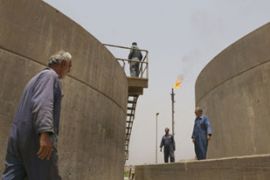“The law is hoped to enable Iraq to achieve its potential and utilise its revenues for the benefit of all Iraqi people.”
Kurdish concerns
The government of Nuri al-Maliki, the Iraqi prime minister, had pledged to reach an agreement on an oil law by the end of 2006 but missed its self-imposed deadline due to Kurdish concerns about relations between the regions and Baghdad.
|
|
Proven reserves:
112.5bn barrels
Production:
2.093m barrels a day
Exports:
1.42m barrels a day
Source: CIA World Factbook
|
After the agreement al-Maliki said: “The benefits of this wealth will form a firm pillar for the unity of Iraqis and consolidate their social structure.”
The Kurdish government had reservations about the wording regarding the powers of a federal council, to be established under the law, which would set oil policy and lay down ground rules for contracts signed with foreign firms.
Officials from Kurdistan, where relative security has encouraged more development than elsewhere in Iraq, had said they wanted assurances that the federal council will not invalidate their existing contracts.
The draft law would allow the Kurdish regional government to review the contracts it has signed to ensure consistency with the terms of the new law, Salih said.
Regional authorities
Regional authorities in Iraq would also be able to negotiate oil contracts with foreign companies.
“Negotiations can be conducted by the regional authority in accordance with procedures and guidelines established by the Federal Council of Oil and Gas,” Salih said.
“The negotiations and contracts will have to be based on the main criteria of maximising revenues for Iraqi people.”
The law will also restructure the Iraqi National Oil Company (INOC) as an independent holding company with affiliated regional operating companies.
“The law ends decades of excessive centralised control over the industry which was often the impediment to development for the sector,” Salih said.
Expert opinion
On Tuesday, Fadil Chalabi, an Iraq oil expert at the Centre for Global Energy Studies, London, told Al Jazeera: “Now that the law allows for provincial governments to negotiate separately with international oil companies, in the same way as the Kurds have done with the Norwegian and Canadian companies in the north of Iraq, I believe if this is going to be the case, then it could have disastrous effects on the development of oil industry in Iraq.
“It will lead to fragmentation, it will have no central planning, no central policy-making authority – and if this is going to be the case, this law could negative effects on the oil industry in Iraq.”
Interviewed on the same Al Jazeera programme, Axel Bush of London’s Energy Intelligence Group said: “The important bit of the law is that the Iraqis are setting up a national council for oil and gas that will oversee the contracts that the individual provinces or regions may indeed negotiate themselves.
“But the contracts must live up to certain commercial criteria that the central government or rather the council will ensure are in line with the national legislation.”
“What they are trying is to ensure that nobody negotiates away the rights of the Iraqi people to the national treasure that oil is.
“The revenue-sharing aspect is a separate law, it is on track but it has not yet been approved. This suggests that revenue will be collected by the central government and then distributed to the provinces according to population density …”
US insistence
Washington has linked its continuing support for the Shia-led national unity government, which also includes ethnic Kurds and Sunni Arabs, to them passing the law but acknowledges the difficulties it faces in reaching a deal.
“The oil law is not just an oil law. It’s a law about dividing the resources of the country and therefore maintaining the unity of Iraq. So it’s not easy,” Condoleezza Rice, the US secretary of state, told the Fox News Sunday programme.
Iraq has the world’s second largest proven oil reserves but has been unable to develop them fully because of decades of sanctions under Saddam Hussein and the violence since the US-led invasion in March 2003.
